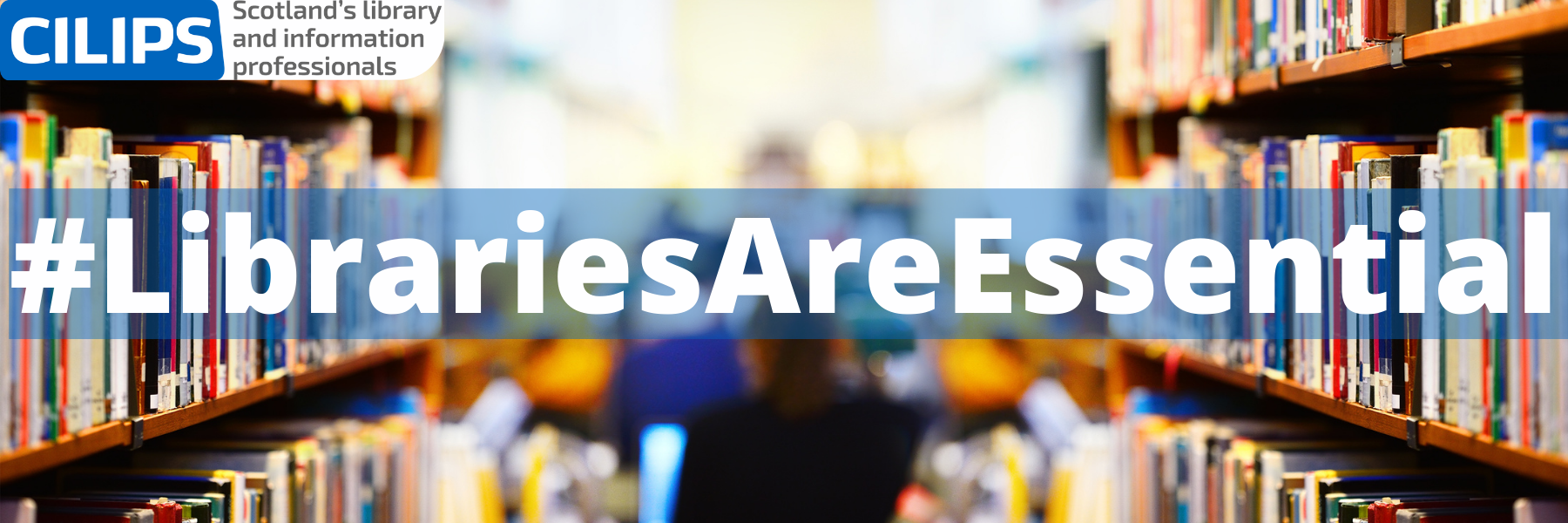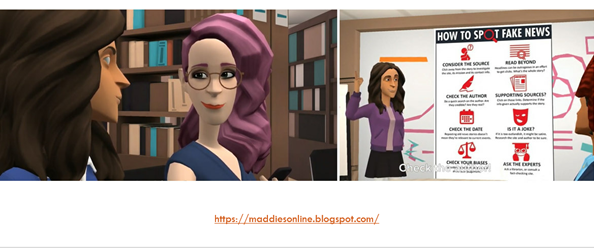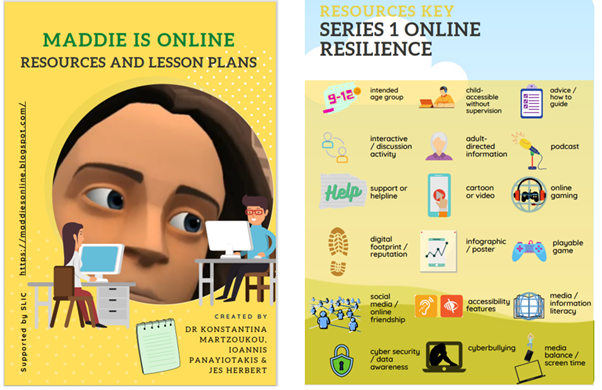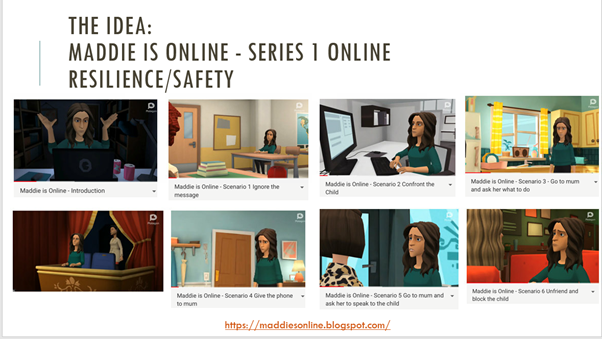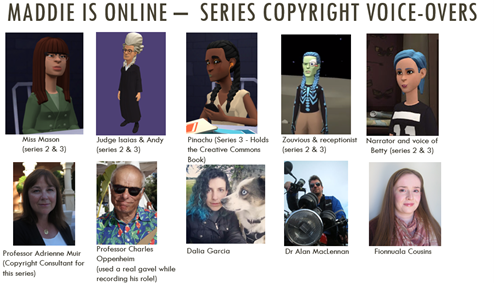#LibrariesAreEssential to Young People’s Digital Literacy
Category: #LibrariesAreEssential, Blog, News
by Dr Konstantina Martzoukou, Teaching Excellence Fellow at Robert Gordon University
‘Maddie is Online’: A video cartoon open-access resource on information and digital literacy available for schools
One evening, my children and their friends knocked on our house door:
‘Is it okay if we crack eggs on our heads?’
‘Why do you want to crack eggs on your head, that’s silly!’ I replied.
‘We have to. That’s the only way we can get many likes,’ they said enthusiastically. They were just 10 years old. These days we hear a lot in the media and in research about pre-teens and how they seem to be constantly plugged into video games, social networking sites and text messaging. There are also plenty of negative gender stereotypes to choose from, not to mention a complex advertising world which has children as its target market. Children experience social pressure to be connected and popular all the time. Almost half (45%) of 11-18-year olds admit checking their mobile device after going to bed. One in ten 12-15s has ‘gone live’ by sharing a video using live streaming services such as Facebook Live, Snapchat’s Live Stories or Instagram Live while they also adopt new ways of interacting, e.g. sending messages every day over consecutive days and diversifying their online media use (e.g. TikTok and Twitch are becoming popular tools) (Ofcom, 2019). An enquiry report by Young Minds and the Children’s Society, based on data from a survey of 1,089 young people aged 11–25 conducted in the UK in 2017, found that the use of social media by children younger than the age of 12 is commonplace, with 61% of young people having their first account at age 12 or under, even though the most popular social media tools – including Snapchat, YouTube, Tik Tok and Instagram – clearly indicate that they are aimed at children 13 years old and above (The Children’s Society and Young Minds 2018).
As is clear from the above issues, more emphasis is required on keeping the communication between parents, teachers and children open about both the challenges and the opportunities of online connectivity in the school and the home environment, as well as on the development of a digital literacy and resilience mindset early in education. However, both teachers and parents may lack the resources, time or knowledge that would allow them to support children with digital literacy and resilience. There is now a unique opportunity for librarians, working in both school and public contexts, to be at the forefront of information literacy and digital literacy provision, and to drive that school agenda forward. Young people should be in a position to independently select, access and use accurate, reliable, trustworthy and credible sources of information, not only for learning purposes but also for their own wellbeing. Recent research, for example, on children’s news consumption and attitudes in response to COVID-19 related information has found that for half of 12-15 year old children (52%) it is ‘hard to know what is true and what is false about Coronavirus’, while a quarter (24%) agree that they are ‘confused about what I should be doing in response to Coronavirus’ (Ofcom 2020, p.2).
In addition, there is now a clearer need than ever before to focus on the evolving role of the school librarian in terms of the need for training in pedagogic theory and practice, curriculum design, and mechanisms that will ensure their ongoing personal and professional development. On-going digital literacy training is also required for both librarians and teachers to help young people build important digital literacy skills, such as online resilience and safety.
At Robert Gordon University we are developing an innovative approach to teaching young people information and digital literacy skills and offering flexible training for school librarians, teachers and parents. ‘Maddie is Online’ (click here for the Blog and Introductory Video) is an online video cartoon series which addresses the everyday life experiences of pre-teen children in the online connected environment, and empowers them with skills that help them deal with challenging phenomena in their digital lives (e.g. online bullying, managing online information, copyright and ownership, privacy and security, online reputation).
‘Maddie is Online’ is available for parents, teachers and librarians who may lack knowledge, resources or time and it offers accessible, engaging and fun cartoon stories, training workshops and digital lesson plans that can be incorporated into different school subjects or used at home in a cost-effective and accessible way. The project has received support from the Scottish Library and Information Council (SLIC) SLIF fund on behalf of the Scottish Government: the SLIF award page includes more details about the project. This project supports strategic aims 2 and 4 of Vibrant Libraries, Thriving Schools. All the video playlists can be found here.
We aim to create positive social change via dialogue as few organisations engage with children’s own experiences of online connectivity directly in their training resources. ‘Maddie is Online’ addresses everyday life issues that children encounter online and offers an interesting and fun series of activities, harnessing the educational advantages of cartoon video animation. It is aimed at children (aged 9-12 years old) as a means of engaging them critically with digital literacy, resilience and citizenship principles, which have emerged as key directions in government policy agendas. The animation videos were created using Plotagon Studio, with characters that have voice-over functionality, step-by-step scripts and character expressions. Videos were exported in MP4 video format and uploaded to YouTube. The ‘Maddie is Online’ series has the flexibility and online accessibility of resources that engage children in critical dialogue and activities. Teachers, parents and librarians play an important role in developing a positive online digital citizenship culture for young people. ‘Maddie is Online’ encompasses the emotional dimensions of online connectivity and how it influences mental wellbeing, helping children to engage in discussion about ways to safeguard their digital lives and be smart about the websites they visit as well as the people they engage with while being connected online. We use everyday life stories that are engaging, replicating children’s challenges and we utilise real children’s and adults’ voices.
We are looking to collaborate with vibrant and passionate librarians who wish to make a difference in schools by means of driving the information and digital literacy agenda, enabling partnership with teachers to systematically tackle digital literacy issues and creating a consortium of like-minded individuals who would like to be proactively involved.
The impact of this work focuses on keeping a positive and open dialogue with children around the above issues in an entirely innovative way: initiating conversation and reinforcing children’s digital citizenship skills, creativity and imagination. The interactive resources have been designed in a way no other service has achieved, emphasising children’s voices via a safe, skills-growing and resilient online training approach in schools which offers flexibility.
Currently, there are two available series. Series 1 Online Resilience focuses on online resilience and safety, and consists of 8 short episodes which ask children to choose the best scenario for dealing with issues of online connectivity, safety and resilience.
Series 2 Misinformation consists of 11 longer episodes and aims to teach children the importance of managing online information and particularly information evaluation. This second story, which is a combination of reality and fantasy, involves the adventures of Maddie while searching for information on an unfamiliar country for a class assignment. In her quest to find good quality information, Maddie asks many different people for information, some of whom misinform and misguide her. A taster of episode 10 ‘The Teacher meeting’ from Series 2 Misinformation can be found here.
We have published a paper which explains the work in more detail. A webinar was also recently organised to present the work and the resources which attracted 133 registered participants (teachers, librarians, policy makers and other experts). The recording is available here.
We are now developing a new series with an emphasis on copyright and ownership. We hope to release the new series by the end of April or beginning of May.
Please get in touch with Dr Konstantina (Dina) Martzoukou if you would like to be involved in this project: k.martzoukou@rgu.ac.uk
Details
Project Blog: https://maddiesonline.blogspot.com/
Playlists: bit.ly/2LwnE6T
Twitter: @MaddiesOnline
Email: k.martzoukou@rgu.ac.uk
SLIF Project Leaders: Dr Konstantina Martzoukou & Ioannis Panayiotakis (Robert Gordon University & East Renfrewshire School Libraries).
References
IFLA The International Federation of Library Associations and Institutions (2020), “How to spot fake news”, available at: https://www.ifla.org/publications/node/11174 (accessed March 31, 2021)
Martzoukou, K. 2020, “Academic libraries in COVID-19: a renewed mission for digital literacy”, Library Management, Vol. ahead-of-print No. ahead-of-print. https://doi.org/10.1108/LM-09-2020-0131(accessed March 31, 2021)
Martzoukou, K. 2020, “Maddie is online”: an educational video cartoon series on digital literacy and resilience for children”, Journal of Research in Innovative Teaching & Learning, Vol. ahead-of-print No. ahead-of-print. https://doi.org/10.1108/JRIT-06-2020-0031 (accessed March 31, 2021)
Ofcom 2019, “Children and parents: Media use and attitudes report 2018”, available at: https://www.ofcom.org.uk/__data/assets/pdf_file/0024/134907/children-and-parents-media-use-and-attitudes-2018.pdf (accessed March 31, 2021)
Ofcom 2020, “Covid-19 news and information: 12-15 year old children’s news consumption and attitudes”, available at: https://www.ofcom.org.uk/__data/assets/pdf_file/0027/195345/covid-19-news-consumption-children-12-15-report.pdf (accessed March 31, 2021)
The Children’s Society and YoungMinds 2018, “Safety Net: Cyberbullying’s impact on young people’s mental health Inquiry report”, available at: https://www.alexchalk.com/sites/www.alexchalk.com/files/201804/pcr144b_social_media_cyberbullying_inquiry_full_report.pdf (accessed March 31, 2021)
